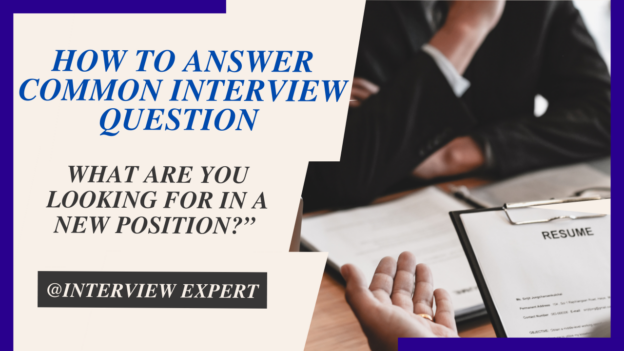I know how you feel. This common interview question may give you the feeling similar to being pushed against a wall or seemingly trapped, which is inevitable not to recognize due to the tricky nature of this common interview question. The fact is, it will depend on the humor of whoever interviews you. Overall, though, that is not the best option to consider because what you want to do is be safe but thorough. Always note that you want to be sincere, but simultaneously, you want to be tactful when you respond to this common interview question. With that said, let’s acquaint ourselves with tips on answering this common interview question appropriately.
You may classify this common interview question as a behavioral question. Know that when an interviewer asks the question, “What are you looking for in a new job?” They are looking for identifiers about your motivation, values, priorities, goals, or even your vision if it is aligned with the desired position or organization role that you are eyeing.
Before an interview, it is imperative to thoroughly research the company’s values to tailor your responses effectively. Companies prefer hiring candidates who align with their mission and vision aside from the ability to contribute to their growth. The key is to craft a response highlighting your expectations while emphasizing your fit with the company’s mission, vision, and overall culture.
During the interview, do not be surprised if the interviewer uses different words like “opportunity” or “role” instead of “position” or “job.” Using those terms essentially conveys the same question presented in a different form.
If you need help, let us investigate possible responses to the common interview question, “What are you looking for in a position?” We will explore this guide and draft sample responses to this common interview question.
FIRST – Begin with your skills
If we look at it from the interviewer’s or the hiring manager’s viewpoint, the common interview question centers around you. When seeking employment, do not focus on perks like high pay, convenient commutes, or sleeping quarters. Those will not leave a lasting impression on potential employers. You want to emphasize your skills, and we know that this is top-tier for any recruiter out there! Your skills are going to be the primary focus, as always. Highlight your desire for a role that allows you to effectively utilize your abilities and make a meaningful contribution to the organization. Showcase your skill set by demonstrating how to use specific skills to bring projects to fruition.
Sample Response:
“With several years of honed graphic design and marketing skills, I am actively seeking a position where I can continue exercising and enhancing these abilities as a top priority, which would, in turn, provide financial returns for the company.”
SECOND – Elaborate on your motivation
Address this openly during the interview to alleviate recruiters’ concerns about your motivations beyond monetary compensation. You may share specific examples of what motivates you and further elaborate on how those motivations align with the position or company culture.
Sample response:
“For me, an essential aspect of the position is the opportunity to not just show my skill in creating relevant graphics for any project that will be assigned to me but also to directly present my findings and recommendations to clients, per my marketing skills. This aspect would be incredibly fulfilling and refreshing because I’ve always been passionate about my work. I get more motivated when I see the tangible impact of my work on others.”
THIRD – Show connection with your long-term goals
Recruiting employees entails substantial investment, as always, so it is crucial to retain these hires. When discussing your career aspirations during an interview, whether behavior-based or situational, it’s advised to find an opportunity to highlight your long-term commitment to the company. This will prove advantageous on your end unless you are specifically seeking a short-term position. When you present your long-term plans and even add ideal projects in advance (only if possible), this will positively impact your job application.
Sample response:
“In alignment with my career aspirations, I seek a role fostering professional growth and development. I see myself assuming managerial responsibilities in the not-so-distant future. I also plan to continue building my knowledge base by enhancing my skill set because those are crucial to achieving my long-term goals.”
FOURTH – Conclude with a few positive words about the company
For this final guide, as an applicant, do your best to get back to the company as you prepare your response. Depending on how long your answer is, it may make sense, to sum up everything you have talked about and then end by expressing how excited you are about the company and why.
Sample response:
“To sum everything up, I would love a role where my skills will be utilized to the fullest. I want to make an impact that I can witness tangibly. It is amazing to be part of a prestigious organization, and being part of it means working my way towards something I care about and matter. McClan International’s goal of being the prime design, advertising, and marketing agency inspires me, so I’m beyond excited about this opportunity.”
Take note that your response may vary depending on the position you’re applying for. So, you might consider focusing on multiple skills or skip discussing long-term goals, but the main structure will most likely be similar.
Moving forward, knowing what to say is essential, but understanding what to avoid saying is equally important. You want to be tactful and aware. Honesty is appreciated. However, specific matters are best left unsaid, thus being tactful. Here are some things to steer clear of:
Never talk negatively about your former employer.
A common mistake candidates make during the interview process is discussing negative experiences from previous organizations or companies. While it’s understandable to have had challenging experiences, it’s generally advisable to refrain from mentioning them during an interview. Recruiters and hiring managers don’t appreciate gossip. They want to see positive and enthusiastic candidates about the opportunity at hand. Sharing negative experiences can create a negative impression and make you appear unprofessional or bitter.
Furthermore, focusing on negative experiences can distract from the primary goal of the interview, which is to showcase your skills, qualifications, and why you’re the best fit for the position. Keeping the conversation centered on your strengths and how you can contribute to the company is essential.
Instead of dwelling on negative experiences, focus on what you want to achieve in the new company. Discuss your goals and aspirations and how the organization aligns with your career aspirations. Emphasize the positive aspects of your past experiences, such as lessons learned and skills developed. By highlighting your positive experiences and qualities, you will demonstrate your enthusiasm and professionalism. It will also allow the interviewer to see how you can be an asset to their company, making you a more attractive candidate.
Avoid setting overly idealistic expectations.
In an interview, it is essential to demonstrate motivation and set goals, but it is crucial to keep expectations realistic. For example, suppose you are applying for an entry-level position. In that case, expressing a desire to become Vice President within two years may be considered overly ambitious, even though it is not impossible. The recruiter/interviewer/hiring manager may question whether your expectations align with the company’s growth trajectory, potentially raising concerns about whether you are the best fit for the role.
Prioritize long-term growth over short-term gains.
We all know that a good salary and benefits are essential, and hiring managers know what applicants want. However, they also want to understand what else drives and excites you. Focusing solely on money can make it appear that you are not genuinely interested in the company or the role. You don’t want to give them the impression that you might be more likely to leave if a better opportunity arises. So, it is wise to approach the conversation with a broader perspective.
Remember, the interview process is a two-way conversation. While it’s an opportunity for the company to assess your fit for the role, it’s also a chance for you to evaluate if the company is the right fit for you. Overall, it is crucial to approach interviews with a positive and forward-looking mindset. Following the steps to correctly answer the interview question “What Are You Looking for in a New Position?” common interview questions will make you more confident about stepping into that experience, leaving a lasting impression, and increasing your chances of securing the desired job.
Want us to hone your skills so you can respond best to several challenging common interview questions? Reach out to us at www.interview-expert.com or call us at 859-572-4499, and we will make every effort to ensure that you succeed!


